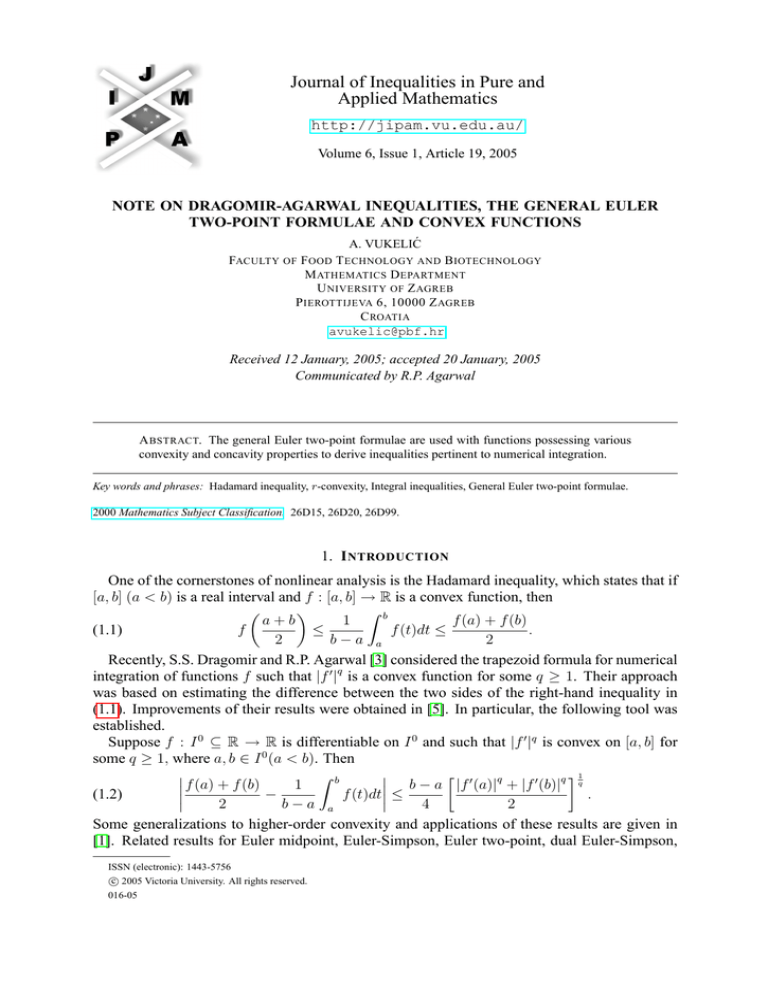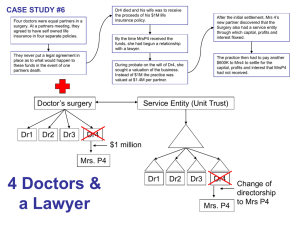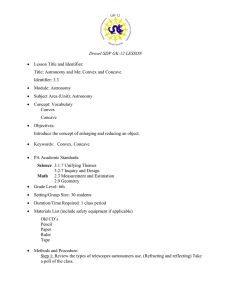
Journal of Inequalities in Pure and
Applied Mathematics
http://jipam.vu.edu.au/
Volume 6, Issue 1, Article 19, 2005
NOTE ON DRAGOMIR-AGARWAL INEQUALITIES, THE GENERAL EULER
TWO-POINT FORMULAE AND CONVEX FUNCTIONS
A. VUKELIĆ
FACULTY OF F OOD T ECHNOLOGY AND B IOTECHNOLOGY
M ATHEMATICS D EPARTMENT
U NIVERSITY OF Z AGREB
P IEROTTIJEVA 6, 10000 Z AGREB
C ROATIA
avukelic@pbf.hr
Received 12 January, 2005; accepted 20 January, 2005
Communicated by R.P. Agarwal
A BSTRACT. The general Euler two-point formulae are used with functions possessing various
convexity and concavity properties to derive inequalities pertinent to numerical integration.
Key words and phrases: Hadamard inequality, r-convexity, Integral inequalities, General Euler two-point formulae.
2000 Mathematics Subject Classification. 26D15, 26D20, 26D99.
1. I NTRODUCTION
One of the cornerstones of nonlinear analysis is the Hadamard inequality, which states that if
[a, b] (a < b) is a real interval and f : [a, b] → R is a convex function, then
Z b
a+b
1
f (a) + f (b)
(1.1)
f
≤
f (t)dt ≤
.
2
b−a a
2
Recently, S.S. Dragomir and R.P. Agarwal [3] considered the trapezoid formula for numerical
integration of functions f such that |f 0 |q is a convex function for some q ≥ 1. Their approach
was based on estimating the difference between the two sides of the right-hand inequality in
(1.1). Improvements of their results were obtained in [5]. In particular, the following tool was
established.
Suppose f : I 0 ⊆ R → R is differentiable on I 0 and such that |f 0 |q is convex on [a, b] for
some q ≥ 1, where a, b ∈ I 0 (a < b). Then
1
Z b
f (a) + f (b)
b − a |f 0 (a)|q + |f 0 (b)|q q
1
(1.2)
−
f (t)dt ≤
.
2
b−a a
4
2
Some generalizations to higher-order convexity and applications of these results are given in
[1]. Related results for Euler midpoint, Euler-Simpson, Euler two-point, dual Euler-Simpson,
ISSN (electronic): 1443-5756
c 2005 Victoria University. All rights reserved.
016-05
2
A. V UKELI Ć
Euler-Simpson 3/8 and Euler-Maclaurin formulae were considered in [7] and for Euler twopoint formulae in [9] (see also [2] and [8]).
In the paper [4] Dah-Yan Hwang procured some new inequalities of this type and he applied
the result to obtain a better estimate of the error in the trapezoidal formula.
In this paper we consider some related results using the general Euler two-point formulae.
We will use the interval [0, 1] because of simplicity and since it involves no loss in generality.
2. T HE G ENERAL E ULER T WO - POINT F ORMULAE
In the recent paper [6] the following identities, named the general Euler two-point formulae,
have been proved. Let f ∈ C n ([0, 1], R) for some n ≥ 3 and let x ∈ [0, 1/2]. If n = 2r −1, r ≥
2, then
Z 1
Z 1
1
1
x
(2.1)
f (t)dt = [f (x) + f (1 − x)] − Tr−1 (f ) +
f (2r−1) (t)F2r−1
(t)dt,
2
2(2r
−
1)!
0
0
while for n = 2r, r ≥ 2 we have
Z 1
Z 1
1
1
x
(2.2)
f (t)dt = [f (x) + f (1 − x)] − Tr−1 (f ) +
f (2r) (t)F2r
(t)dt
2
2(2r)! 0
0
and
Z
(2.3)
0
1
1
1
f (t)dt = [f (x) + f (1 − x)] − Tr (f ) +
2
2(2r)!
Z
1
f (2r) (t)Gx2r (t)dt.
0
Here we define T0 (f ) = 0 and for 1 ≤ m ≤ bn/2c
Tm (f ) =
m
X
B2k (x) (2k−1)
f
(1) − f (2k−1) (0) ,
(2k)!
k=1
Gxn (t) = Bn∗ (x − t) + Bn∗ (1 − x − t)
and
Fnx (t) = Bn∗ (x − t) + Bn∗ (1 − x − t) − Bn (x) − Bn (1 − x),
where Bk (·), k ≥ 0, is the k-th Bernoulli polynomial and Bk = Bk (0) = Bk (1)(k ≥ 0)
the k-th Bernoulli number. By Bk∗ (·)(k ≥ 0) we denote the function of period one such that
Bk∗ (x) = Bk (x) for 0 ≤ x ≤ 1.
x
n x
r−1 x
r x
It was hproved in [6]
that Fn (1 − t) = (−1) Fn (t), (−1) F2r−1 (t) ≥ 0, (−1) F2r (t) ≥ 0
x
x
for x ∈ 0, 21 − 2√1 3 and t ∈ [0, 1/2], and (−1)r F2r−1
(t) ≥ 0, (−1)r−1 F2r
(t) ≥ 0 for x ∈
i
1
√
, 1 and t ∈ [0, 1/2]. Also
2 3 2
Z 1
x
2
1
F2r−1 (t) dt = B2r
,
−
x
−
B
(x)
2r
r
2
0
Z 1
x
|F2r
(t)| dt = 2|B2r (x)|
0
and
Z
1
|Gx2r (t)| dt ≤ 4|B2r (x)|.
0
With integration by parts, we have that the following identities hold:
Z 1
Z 1
y y
2
1
x
x
(1) C1 (x) =
F2r−1
dy = −
F2r−1 1 −
dy =
B2r (x) − B2r
−x ,
2
2
r
2
0
0
J. Inequal. Pure and Appl. Math., 6(1) Art. 19, 2005
http://jipam.vu.edu.au/
D RAGOMIR -AGARWAL INEQUALITIES
1
Z
(2)
x
yF2r−1
C2 (x) =
(3)
x
y)F2r−1
(1 −
y 2
0
1
Z
(4)
1
Z
(5)
y x
yF2r
C5 (x) =
2
0
Z
1
Z
1
dy = −
0
Z
1
dy =
2
0
1
Z
y x
F2r
C4 (x) =
x
yF2r−1
0
1
C3 (x) =
1
dy = −
2
0
Z
Z
y 0
3
2
y
1−
dy = − B2r
2
r
1
−x ,
2
2
y
x
(1 − y)F2r−1
1−
dy = B2r (x),
2
r
y
x
F2r
1−
dy = −2B2r (x),
2
dy
y
x
dy
yF2r
1−
2
0
8
1
=
B2r+2 (x) − B2r+2
− x − B2r (x),
(2r + 1)(2r + 2)
2
=
(6)
x
(1 − y)F2r
C6 (x) =
y 2
0
Z
1
dy
y
=
(1 −
1−
dy
2
0
8
1
=
B2r+2
− x − B2r+2 (x) − B2r (x),
(2r + 1)(2r + 2)
2
x
y)F2r
Z
(7)
C7 (x) =
1
Gx2r
y 2
0
Z
(8)
1
yGx2r
C8 (x) =
0
Z
y 2
Z
dy =
0
1
y
Gx2r 1 −
dy = 0,
2
dy
1
y
yGx2r 1 −
dy
2
0
Z 1
y x
=−
(1 − y)G2r
dy
2
0
Z 1
y
=
(1 − y)Gx2r 1 −
dy
2
0
8
1
=
B2r+2 (x) − B2r+2
−x ,
(2r + 1)(2r + 2)
2
=
Theorem 2.1. Suppose f : [0, 1] → R is n-times differentiable and x ∈
i
1
1
√
, .
2 3 2
J. Inequal. Pure and Appl. Math., 6(1) Art. 19, 2005
h
0, 21 −
1
√
2 3
∪
http://jipam.vu.edu.au/
4
A. V UKELI Ć
q
(a) If f (n) is convex for some q ≥ 1, then for n = 2r − 1, r ≥ 2, we have
Z 1
1
(2.4) f (t)dt − [f (x) + f (1 − x)] + Tr−1 (f )
2
0
1− 1 "
f (2r−1) (0)q + f (2r−1) (1)q
q r
1
2 ≤
B2r
− x − B2r (x)
C3 (x) ·
(2r)!
2
2
2
q 1
r
(2r−1) 1 q
.
+ C2 (x) · f
2
2 If n = 2r, r ≥ 2, then
Z 1
1
(2.5) f (t)dt − [f (x) + f (1 − x)] + Tr−1 (f )
2
0
"
(2r) q (2r) q 1
# 1
1
f (0) + f (1)
1
(2r) 1 q q
|B2r (x)|1− q
≤
· C6 (x)
+ C5 (x) f
(2r)!
2
2
2
2 and we also have
Z 1
1
(2.6) f (t)dt − [f (x) + f (1 − x)] + Tr (f )
2
0
1 1
(2r) q
(2r) 1 q (2r) q q
2|B2r (x)|1− q 1
+ f (1)
≤
.
8 C8 (x) f (0) + 2 f
(2r)!
2 q
(b) If f (n) is concave, then for n = 2r − 1, r ≥ 2, we have
Z 1
1
(2.7) f (t)dt − [f (x) + f (1 − x)] + Tr−1 (f )
2
0
"
!#
1
C
(x)
+
C
(x)
1 r
|C
(x)|
3
(2r−1)
(2r−1)
2
2 2
≤
C
(x)
·
f
+
f
1 .
(2r)! 2
2 |C1 (x)| |C1 (x)|
(2.8)
If n = 2r, r ≥ 2, then
Z 1
1
f (t)dt − [f (x) + f (1 − x)] + Tr−1 (f )
2
0
"
|C4 (x)| (2r) |C5 (x)| (2r)
≤
f
+ f
4(2r)! 2|C4 (x)| !#
C6 (x) + 1 C5 (x) 2
.
|C4 (x)|
Proof. First, let n = 2r − 1 for some r ≥ 2. Then by Hölder’s inequality
Z 1
1
f (t)dt − [f (x) + f (1 − x)] + Tr−1 (f )
2
0
Z 1
x
1
F2r−1 (t) · f (2r−1) (t) dt
≤
2(2r − 1)! 0
1q
Z 1
1− 1q Z 1
x
(2r−1) q
x
1
F2r−1 (t) · f
F2r−1 (t) dt
(t) dt
≤
2(2r − 1)!
0
0
1− 1 Z 1
1q
q
x
(2r−1) q
1
2 1
F2r−1 (t) · f
=
B2r
− x − B2r (x)
(t) dt .
2(2r − 1)! r 2
0
J. Inequal. Pure and Appl. Math., 6(1) Art. 19, 2005
http://jipam.vu.edu.au/
D RAGOMIR -AGARWAL INEQUALITIES
5
Now, by the convexity of |f (2r−1) |q we have
Z 1
x
F2r−1 (t) · f (2r−1) (t)q dt
0
1
2
Z
=
x
F2r−1 (t) · f (2r−1) (t)q dt +
0
1
Z
1
x
F2r−1 (t) · f (2r−1) (t)q dt
2
q
1 1 x y (2r−1)
1 =
(1 − y) · 0 + y ·
dy
F2r−1
· f
2 0
2
2 q
Z
1 1 1 x y (2r−1)
+
(1 − y) · 1 + y ·
dy
F2r−1 1 −
· f
2 0
2
2 Z
y q
1 1
x
(1 − y)F2r−1
dy · f (2r−1) (0)
≤
2
2
0
Z 1
q
y 1 x
(2r−1)
+
yF2r−1
dy · f
2
2 Z0 1
y (2r−1) q
x
+ (1 − y)F2r−1
1−
dy · f
(1)
2
0
Z 1
q y (2r−1) 1 x
dy · f
.
+
yF2r−1 1 −
2
2 0
q
On the other hand, if f (2r−1) is concave, then
Z 1
1
f
(t)dt
−
[f
(x)
+
f
(1
−
x)]
+
T
(f
)
r−1
2
0
Z 1
x
1
F2r−1 (t) · f (2r−1) (t) dt
≤
2(2r − 1)! 0
"Z
#
Z 1
1/2 1
x
x
F2r−1
F2r−1
=
(t) · f (2r−1) (t) dt +
(t) · f (2r−1) (t) dt
2(2r − 1)! 0
1/2
Z 1 1
y (2r−1)
1 x
=
(1 − y) · 0 + y ·
dy
F2r−1
· f
2(2r − 1)! 0
2
2 Z 1
y (2r−1)
1 x
+
(1 − y) · 1 + y ·
dy
F2r−1 1 −
· f
2
2 0
R 1
y
Z 1
1
x
(2r−1) 0 F2r−1 2 ((1 − y) · 0 + y · 2 )dy 1
y
x
R
≤
F
dy · f
1 x
y
4(2r − 1)! 0 2r−1 2
0 F2r−1 2 dy
R 1
y
Z 1
1
x
F
1
−
((1
−
y)
·
1
+
y
·
)dy
2r−1
2
2
0
y
x
,
R
+ F2r−1
1−
dy · f (2r−1)
1 x
y
2
0
0 F2r−1 1 − 2 dy Z
so the inequality (2.4) and (2.7) are completely proved.
The proofs of the inequalities (2.5), (2.8) and (2.6) are similar.
Remark 2.2. For (2.7) to be satisfied it is enough to suppose that |f (2r−1) | is a concave function.
For if |g|q is concave and [0, 1] for some q ≥ 1, then for x, y ∈ [0, 1] and λ ∈ [0, 1]
|g(λx + (1 − λ)y)|q ≥ λ|g(x)|q + (1 − λ)|g(y)|q ≥ (λ|g(x)| + (1 − λ)|g(y)|)q ,
J. Inequal. Pure and Appl. Math., 6(1) Art. 19, 2005
http://jipam.vu.edu.au/
6
A. V UKELI Ć
by the power-mean inequality. Therefore |g| is also concave on [0, 1].
Remark 2.3. If in Theorem 2.1 we chose x = 0, 1/2, 1/3, we get generalizations of the
Dragomir-Agarwal inequality for Euler trapezoid (see [4]) , Euler midpoint and Euler two-point
Newton-Cotes formulae respectively.
The resultant formulae in Theorem 2.1 when r = 2 are of special interest, so we isolate it as
corollary.
h
1
1
√
Corollary 2.4. Suppose f : [0, 1] → R is 4-times differentiable and x ∈ 0, 2 − 2 3 ∪
i
1
1
√
,
.
2 3 2
q
(a) If f (3) is convex for some q ≥ 1, then
1− 1
3 3 2
q
1 0
1
1
1
0
2x − x + [f (1) − f (0)] ≤
f (t)dt − [f (x) + f (1 − x)] +
2
12
12 2
16 0
"
q 1
q
q
4
4 x2
1 f (3) (0) + f (3) (1)
7 (3) 1 q
3
2
× x − 2x + x − + −x +
−
f
30
2
2
240 2 Z
1
q
and if f (4) is convex for some q ≥ 1, then
1− 1
q
1
1 0
1
1
x4 − 2x3 + x2 − f (t)dt − [f (x) + f (1 − x)] +
[f (1) − f 0 (0)] ≤
2
12
24 30 0
"
q
q
2x5
3x2
1 f (4) (0) + f (4) (1)
4
3
× −x +x −
+ 5
8
96
2
q 1
2x5
5x2
11 (4) 1 q
3
+ −
+x −
+
f
.
5
8
480 2 (b) If f (3) is concave, then
Z
1
Z
1
0
1
1 0
0
f (t)dt − [f (x) + f (1 − x)] +
[f (1) − f (0)]
2
12
x2
7 4
1 3 3 2
1 (3) −x + 2 − 240
≤
2x − x + f
−4x3 + 3x2 − 1 24 2
16 8
4
x
5x2
23 3
2 − 2x + 4 − 480
+ f (3) 3 + 3x2 − 1 −2x
2
16
and if f (4) is concave, then
Z
0
1
1
1 0
0
f (t)dt − [f (x) + f (1 − x)] +
[f (1) − f (0)]
2
12
J. Inequal. Pure and Appl. Math., 6(1) Art. 19, 2005
http://jipam.vu.edu.au/
D RAGOMIR -AGARWAL INEQUALITIES
7
4x5
5x2
11 3
−
+
2x
−
+
5
4
240 1 4
1 (4)
3
2
≤
x
−
2x
+
x
−
f
−4x4 + 8x3 − 4x2 + 2 48 30 15
5
2x
11x2
7 4
3
−
2x
+
3x
−
+
5
8
160 .
+ f (4) −2x4 + 4x3 − 2x2 + 1 15
Now, we will give some results of the same type in the case when r = 1.
Theorem 2.5. Suppose f : [0, 1] → R is 2-times differentiable.
(a) If |f 0 |q is convex for some q ≥ 1, then for x ∈ [0, 1/2] we have
1
Z
0
1
f (t)dt − [f (x) + f (1 − x)]
2
1
|8x2 − 4x + 1|1− q
≤
· 2x2 − 2x +
4
2 |f 0 (0)|q + |f 0 (1)|q
3
2
q 1
1
1 q
2
+ −2x + 2x + f 0
.
3
2 If |f 00 |q is convex for some q ≥ 1 and x ∈ [0, 1/4], then
1
Z
0
1
f (t)dt − [f (x) + f (1 − x)]
2
1− 1
q
−6x2 +6x−1 2
3/2 + 3 (1 − 4x) 3
≤
4
00
q
00
q
2
−x + x − 1 |f (0)| + |f (1)|
8
2
q 1
5
1 q
2
+ −2x + 2x − f 00
,
24
2 while for x ∈ [1/4, 1/2] we have
Z
1
0
1
f (t)dt − [f (x) + f (1 − x)]
2
1
−6x2 +6x−1 1− q
3
≤
4
2
−x + x −
1 |f 00 (0)|q + |f 00 (1)|q
8
2
q 1
5
1 q
2
+ −2x + 2x − f 00
.
24
2 (b) If |f 0 | is concave for some q ≥ 1, then for x ∈ [0, 1/2] we have
Z
0
1
1 0 2
1
f −x + x +
f (t)dt − [f (x) + f (1 − x)] ≤
2
8 J. Inequal. Pure and Appl. Math., 6(1) Art. 19, 2005
1 0 2
+ f x − x +
6 5 .
6 http://jipam.vu.edu.au/
8
A. V UKELI Ć
If |f 00 | is concave for some q ≥ 1 and x ∈ [0, 1/2], then
Z 1
1
f (t)dt − [f (x) + f (1 − x)]
2
0
! "
5 2
−2x
+
2x
−
1 1
00
24
≤ −3x2 + 3x − f 00 + f
8
3 −6x2 + 6x − 23 !#
−2x2 + 2x − 11 48
−3x2 + 3x − 1 .
3
Proof. It was proved in [6] that for x ∈ [0, 1/2]
Z 1
8x2 − 4x + 1
|F1x (t)|dt =
,
2
0
for x ∈ [0, 1/4]
Z
1
|F2x (t)|dt =
0
−6x2 + 6x − 1 2
+ (1 − 4x)3/2 ,
3
3
and for x ∈ [1/4, 1/2]
1
−6x2 + 6x − 1
.
3
0
So, using identities (2.1) and (2.2) with calculation of C1 (x), C2 (x), C3 (x), C4 (x), C5 (x) and
C6 (x) similar to that in Theorem 2.1 we get the inequalities in (a) and (b).
Z
|F2x (t)|dt =
Remark 2.6. For x = 0 in the above theorem we have the trapezoid formula and for |f 00 |q a
convex function and |f 00 | a concave function we get the results from [4].
If |f 0 |q is convex for some q ≥ 1, then
#1
"
q
Z 1
0
q
0 1
0
q q
|f
(0)|
+
|f
|
+
|f
(1)|
1
1
2
f (t)dt − [f (0) + f (1)] ≤
3
2
4
0
and if |f 0 | is concave, then
Z 1
1 0 1 0 5 1
f
+ f
.
f (t)dt − [f (0) + f (1)] ≤
2
8 6 6 0
For x = 1/4 we get two-point Maclaurin formula and then if |f 0 |q is convex for some q ≥ 1,
then
"
#1
q
Z 1
0
q
0 1
0
q q
7|f
(0)|
+
34|f
|
+
7|f
(1)|
1
1
3 1
2
f (t)dt −
f
+f
≤
2
4
4 8
24
0
and if |f 00 |q is convex for some q ≥ 1, then
"
#1
q
Z 1
00
q q
00
q
00 1
|
+
3|f
(1)|
3|f
(0)|
+
16|f
1
1
3
1
2
≤
f (t)dt −
f
+f
.
96
2
4
4
4
0
If |f 0 | is concave, then
Z 1
1
1
3 1 0 17 0 31 f (t)dt −
f
+f
≤
f
+ f
2
4
4 8 48 48 0
and if |f 00 | is concave for some q ≥ 1, then
Z 1
1
1
3 11 00 4 00 7 f (t)dt −
f
+f
≤
f
+ f
.
2
4
4 384 11 11 0
J. Inequal. Pure and Appl. Math., 6(1) Art. 19, 2005
http://jipam.vu.edu.au/
D RAGOMIR -AGARWAL INEQUALITIES
9
For x = 1/3 we get two-point Newton-Cotes formula and then if |f 0 |q is convex for some
q ≥ 1, then
#1
"
q
Z 1
0
q q
0
q
0 1
|
+
|f
(1)|
|f
(0)|
+
7|f
1
1
2
5
2
≤
f (t)dt −
f
+f
5
2
3
3 36
0
and if |f 00 |q is convex for some q ≥ 1, then
Z
0
1
# 1q
"
1
2 1 7|f 00 (0)|q + 34|f 00 12 |q + 7|f 00 (1)|q
1
.
f
+f
≤
f (t)dt −
16
2
3
3 36
If |f 0 | is concave, then
Z 1
1
1
2 1 0 7 0 11 f
+f
≤
f
+ f
f (t)dt −
2
3
3 8 18 18 0
and if |f 00 | is concave for some q ≥ 1, then
Z 1
00 17 00 31 1
1
2
1
≤
f
+ f
.
f (t)dt −
f
+f
2
3
3
24 48 48 0
For x = 1/2 we get midpoint formula and then if |f 0 |q is convex for some q ≥ 1, then
"
#1
Z 1
1 |f 0 (0)|q + 10|f 0 21 |q + |f 0 (1)|q q
1
≤
f (t)dt − f
4
2
12
0
and if |f 00 |q is convex for some q ≥ 1, then
#1
"
q
Z 1
00
q q
00
q
00 1
3|f
(0)|
+
14|f
|
+
3|f
(1)|
1
1
2
≤
f (t)dt − f
.
24
8
2
0
If |f 0 | is concave, then
Z 1
1 1 0 5 0 7 f (t)dt − f
≤
f
+ f
2 8 12 12 0
and if |f 00 | is concave for some q ≥ 1, then
Z 1
1 5 00 7 00 13 f (t)dt − f
≤
f
+ f
.
2 96 20 20 0
R EFERENCES
[1] Lj. DEDIĆ, C.E.M. PEARCE AND J. PEČARIĆ, Hadamard and Dragomir-Agarwal inequalities,
higher-order convexity and the Euler formula, J. Korean Math. Soc., 38 (2001), 1235–1243.
[2] Lj. DEDIĆ, C.E.M. PEARCE AND J. PEČARIĆ, The Euler formulae and convex functions, Math.
Inequal. Appl., 3(2) (2000), 211–221.
[3] S.S. DRAGOMIR AND R.P. AGARWAL, Two inequalities for differentiable mappings and applications to special means of real numbers and to trapezoidal formula, Appl. Mat. Lett., 11(5) (1998),
91–95.
[4] D.Y. HWANG, Improvements of Euler-trapezodial type inequalities with higher-order convexity and
applications, J. of Inequal. in Pure and Appl. Math., 5(3) (2004), Art. 66. [ONLINE: http://
jipam.vu.edu.au/article.php?sid=412]
J. Inequal. Pure and Appl. Math., 6(1) Art. 19, 2005
http://jipam.vu.edu.au/
10
A. V UKELI Ć
[5] C.E.M. PEARCE AND J. PEČARIĆ, Inequalities for differentiable mappings and applications to
special means and quadrature formulas, Appl. Math. Lett., 13 (2000), 51–55.
[6] J. PEČARIĆ, I. PERIĆ
ANZIAM J.
AND
A. VUKELIĆ, On general Euler two-point formulae, to appear in
[7] J. PEČARIĆ AND A. VUKELIĆ, Hadamard and Dragomir-Agarwal inequalities, the Euler formulae
and convex functions, Functional Equations, Inequalities and Applications, Th.M. Rassias (ed.).,
Dordrecht, Kluwer Academic Publishers, 2003.
[8] J. PEČARIĆ AND A. VUKELIĆ, On generalizations of Dragomir-Agarwal inequality via some
Euler-type identities, Bulletin de la Société des Mathématiciens de R. Macédoine, 26 (LII) (2002),
17–42.
[9] J. PEČARIĆ AND A. VUKELIĆ, Hadamard and Dragomir-Agrawal inequalities, the general Euler
two-point formulae and convex function, to appear in Rad HAZU, Matematičke Znanosti.
J. Inequal. Pure and Appl. Math., 6(1) Art. 19, 2005
http://jipam.vu.edu.au/







